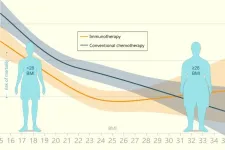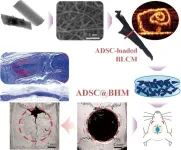BMI’s relation to cancer therapy mortality risks not so straightforward
Whether immunotherapy or conventional chemotherapy carries less mortality risk depends on BMI
2024-09-12
(Press-News.org)
While being overweight increases the risk of developing lifestyle-related diseases, there is a phenomenon known as the obesity paradox where a decreased risk of death has been seen during cancer therapy. However, that paradox might not be the trend for all cancer therapies, an Osaka Metropolitan University team reports in JAMA Network Open, a publication of the American Medical Association.
Led by graduate student Mr. Yasutaka Ihara and Professor Ayumi Shintani of the Graduate School of Medicine’s Department of Medical Statistics, the team used a Japanese administrative claims database of more than 500,000 lung cancer patients and examined the relation between body mass index (BMI) and the risk of mortality during immunotherapy and conventional chemotherapy.
Focusing only on patients with advanced non-small cell lung cancer, the team found that the higher the BMI, the lower the risk of mortality when undergoing both immunotherapy and chemotherapy, though it does a U-turn around a BMI of 24. Patients with a BMI under 28 showed lower risk of mortality when undergoing immunotherapy compared to conventional chemotherapy, but for those at or over that figure, the risk increases with immunotherapy while it continues to get lower with chemotherapy.
“Immunotherapy might not always be the optimal treatment method for obese patients with advanced non-small cell lung cancer, so the use of conventional chemotherapy should also be considered,” Mr. Ihara stated. “In addition to BMI, age, hormones, and gut microbiota have been reported as factors that influence the effectiveness of immunotherapy. Evaluation of whether immunotherapy or conventional chemotherapy improves survival in the presence of these factors is expected to contribute to the development of precision medicine.”
###
About OMU
Established in Osaka as one of the largest public universities in Japan, Osaka Metropolitan University is committed to shaping the future of society through “Convergence of Knowledge” and the promotion of world-class research. For more research news, visit https://www.omu.ac.jp/en/ and follow us on social media: X, Facebook, Instagram, LinkedIn.
END
ELSE PRESS RELEASES FROM THIS DATE:
2024-09-12
Screens have become ubiquitous in our daily lives — which means they’ve also become part of children’s lives too. So what effect does this have on children’s developing brains, especially critical language skills? To understand this, scientists in Estonia surveyed the parents of more than 400 children about their screen use, their children’s screen use, and their children’s language skills. They found that parents who use screens a lot also have children who use screens a lot, and that children’s higher screen time is associated with poorer language skills.
“Our ...
2024-09-12
Scientists at the Medical College of Georgia at Augusta University are searching for a new treatment target for a common complication of diabetes that can cause retinal blood vessels to break down, leak, or become blocked.
Diabetic retinopathy is a serious eye disease and a leading cause of blindness that results when diabetes’ sustained high blood sugar levels cause damage to the retina – the part of the eye that detects light – over time. That can happen in a number of ways, from inflammation to overgrowth ...
2024-09-12
Prescribing rates for stimulants that treat attention-deficit/hyperactivity disorder (ADHD) have increased significantly over the past decade, with some of the largest increases reported during the COVID-19 pandemic. A new study of adult emergency department admissions at Mass General Brigham, led by McLean Hospital researchers, found that individuals who are taking high doses of amphetamine (e.g. Adderall) face more than a five-fold increased risk for developing psychosis or mania. Findings were published September 12th in the American Journal of Psychiatry.
Overall, individuals with past-month prescription amphetamine use had a greater likelihood of new-onset psychosis or mania ...
2024-09-12
With flu season just around the corner and COVID-19 cases on the rise, a new nationwide survey from The Ohio State University Wexner Medical Center reveals hesitancy around vaccines this fall. The new data comes just as this year’s flu shot rolls out and following the FDA’s approval of an updated round of COVID-19 vaccines.
The national poll of 1,006 people found more than one-third (37%) have gotten vaccines in the past but do not plan to this year. The same percent of respondents said they don’t need any of the vaccines surveyed in the poll, including flu, COVID-19, pneumococcal and respiratory ...
2024-09-12
Scientists from Sun Yat-sen University's School of Biomedical Engineering have developed groundbreaking tubular scaffolds made from electrospun membranes, which significantly enhance bone regeneration in critical skull defects. These scaffolds, designed to mimic natural bone structures, create an ideal environment for adipose-derived stem cells (rADSCs) to thrive and accelerate healing. By integrating advanced materials like polycaprolactone, PLGA, and nano-hydroxyapatite, the researchers achieved remarkable results in both lab and animal studies, ...
2024-09-12
Nobel laureate Pierre Agostini, winner of the 2023 prize in physics, will headline a special two-day event hosted by the University of Tokyo on Sept. 26-27. The keynote lecture by Agostini, renowned for this pioneering work in attosecond science, will be part of a larger symposium bringing together researchers from around the world to celebrate the university’s planned Attosecond Laser Facility (ALFA), and discuss the latest developments and future directions of attosecond science.
Have you taken a photo of a fast-moving animal or vehicle and noticed how blurry the subject can be? This is likely because the faster a moving subject is, the faster the camera’s shutter needs ...
2024-09-11
Toronto, ON, September 11, 2024 — A single dose of the Modified vaccinia Ankara-Bavarian Nordic (MVA-BN) was 58% effective in protecting again mpox infection, according to a new study published in BMJ.
Researchers from ICES, Public Health Ontario, and the MAP Centre for Urban Health Solutions at St. Michael’s Hospital of Unity Health Toronto have conducted a target trial emulation to estimate the effectiveness of the mpox vaccine.
During the mpox outbreak in 2022, Ontario, Canada introduced the vaccine ...
2024-09-11
One dose of modified vaccinia Ankara-Bavarian Nordic (MVA-BN) smallpox vaccine is moderately effective in preventing mpox infection and should be made available to communities at risk, finds a study published by The BMJ today.
With mpox infections rising again across the globe, the researchers say these findings “strengthen the evidence that MVA-BN is effective at preventing mpox infection and should be made available and accessible to communities at risk.”
No randomised clinical trials of vaccination against mpox have been conducted. Estimates of the effectiveness of a single dose of vaccination from observational studies range from ...
2024-09-11
More than half of the experts on the UK government’s nutrition advisory panel have links to the food industry, reveals an investigation by The BMJ today.
At least 11 of the 17 members of the Scientific Advisory Committee on Nutrition (SACN) have conflicts of interest with the likes of Nestle, sugar manufacturer Tate and Lyle, and the world’s largest ice cream producer, Unilever, reports freelance journalist Sophie Borland.
And at least six out of the 11 members of SACN’s Subgroup on Maternal and Child Nutrition have ties to food firms, including baby food manufacturers and formula milk brands.
SACN ...
2024-09-11
Giving higher doses per fraction of radiation therapy over a shorter time after breast cancer surgery significantly reduces the risk of side effects and improves quality of life compared with a conventional schedule, finds a study published by The BMJ today.
Although survival and recurrence rates were similar, this approach, known as hypofractionation, is safer, more convenient for patients, and reduces costs for healthcare systems, and should be the preferred treatment option, say the researchers.
Conventional fractionation radiation therapy has been the standard of care for most patients with breast ...
LAST 30 PRESS RELEASES:
[Press-News.org] BMI’s relation to cancer therapy mortality risks not so straightforward
Whether immunotherapy or conventional chemotherapy carries less mortality risk depends on BMI





